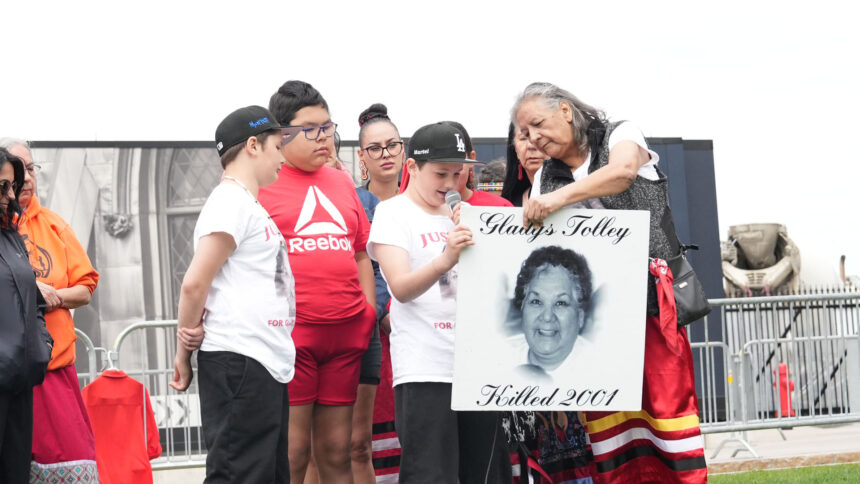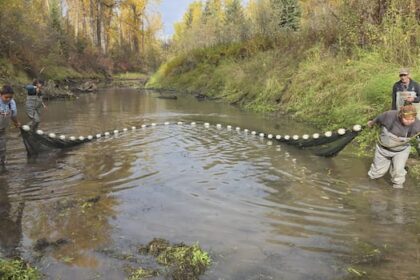Twenty years after Amnesty International released its first report on missing and murdered Indigenous women and girls (MMIWG), a delegation from the international human rights organization gathered on Parliament Hill for Red Dress Day to attend a vigil held by longtime Algonquin activist Bridget Tolley, and her family. The gathering took place near West Block, not far from the site of numerous vigils held over the years. The ceremony featured a youth drum group from Kitigan Zibi—boys aged 10 to 12. Bridget’s nephew, Owen Tolley, 11, and her granddaughter Ava, 10, delivered a speech honouring Gladys Tolley, Bridget’s mother, who was killed on Oct. 5, 2001, when a Québec provincial police cruiser struck her on a dark highway that runs through the reserve. Bridget Tolley has spent years seeking a review of the coroner’s report and an apology from the police. In 2022 she received an apology from three Quebec cabinet ministers because of how the family was treated the night her mother died. But her focus today was on the years that have passed and the intergenerational impact of issues that remain unsolved despite promises from governments and police to do better. She called today’s vigil Kokums of Sister’s in Spirit to emphasize the point. “We bring awareness every day by posting missing and murdered Indigenous women and girls, and this is not right,” she told the crowd of approximately 50 people, which included friends, allies and activists. “We should be happy to be posting the accomplishments of our youth, instead, we’re posting missing and murdered posters of them. This has got to stop. Enough is enough. “ It hurts to be here again, to share our stories after two decades, but we’re still here. We went through a lot of prime ministers, ministers, senators, national organizations, chiefs and councils, but the families are still here and we’re gonna be here till we get truth, accountability, and justice.” Nine officials from Amnesty International attended, holding signs that read No More Stolen Sisters and red scarves. “To see 20 years later we’re still standing here with the families, it’s a failure, it’s a failure of all of us,” said Ketty Nivyabandi, secretary-general of Amnesty International Canada’s English-speaking section. “It breaks my heart to see the trauma that is still visible on the family’s faces, but I am also proud that we stood by them and we have been with them throughout.” Nivyabandi told APTN News that while there have been more commitments from the federal government to Indigenous women over the past two decades—especially following the 2019 Final Report of the national inquiry into MMIWG—those commitments still require funding and implementation. “There are many more commitments, but the lived realities for the families are the same,” she said. Bridget Tolley thanks long time activist and ally Kristen Gilchrist-Salles, director of MMIWG2S+ Initiatives for Les Femmes Michif Otipemisiwak Photo: Karyn Pugliese/APTN. Bridget Tolley acknowledged Kristen Gilchrist-Salles as a longtime ally. Gilchrist-Salles is now the director of MMIWG2S+ Initiatives for Les Femmes Michif Otipemisiwak (Women of the Métis Nation). Earlier that morning, Gilchrist-Salles announced a new joint initiative alongside Pauktuutit, the Ontario Native Women’s Association, and Two Spirits in Motion. The project will collect vital statistics on MMIWG to use evidence-based data to pressure the federal government into fully implementing all 231 Calls for Justice from the national inquiry. Reflecting on her two decades of work in the movement, Gilchrist-Salles expressed frustration with the slow pace of investigations and public response. Read More: REDress project brings together MMIWG activism from across Canada Bridget Tolley among those honoured for often overlooked contributions “I remember like when the Stolen Sisters report came out, there was this sense of like, oh when people find out that’s going to be the change that we need. Like we just need to raise awareness. And you know, like that’s been happening on an ongoing basis, but the violence continues,” she said. “Lately it feels like we’re taking steps backward. There just really seems to be very overt racism and sexism and colonialism that people like—seem proud of. Like there seems to be a whole bunch of folks who are just like loud about their bigotry and like loud about their hatred. And so that’s sort of where I feel like we’ve gone and it’s super depressing.” The vigil also included a performance by hoop-dancer Mariah Miigwans Smith Chabot, who sang and danced in honour of the families gathered. ‘As Native women, we’re very angry and as much as we wanna go in there and pound some doors down and start some fires, we can’t do that. But this we can do,’ says Hoop-dancer Mariah Miigwans Smith Chabot: Photo: Karyn Pugliese/APTN. “ As Native women, we’re very angry and as much as we wanna go in there and pound some doors down and start some fires, we can’t do that. But this we can do,” she said. “I would also like to encourage our men to heal, because when we look at the circle, we all have that space to heal. When our men are singing, our women stand behind the men to protect them, to protect those songs, and to also be that voice behind them. When the women dance, the men stand behind us.” With files from Fraser Needham. Continue Reading
20 years after the first MMIWG report, a new generation dons red dresses

Leave a Comment









